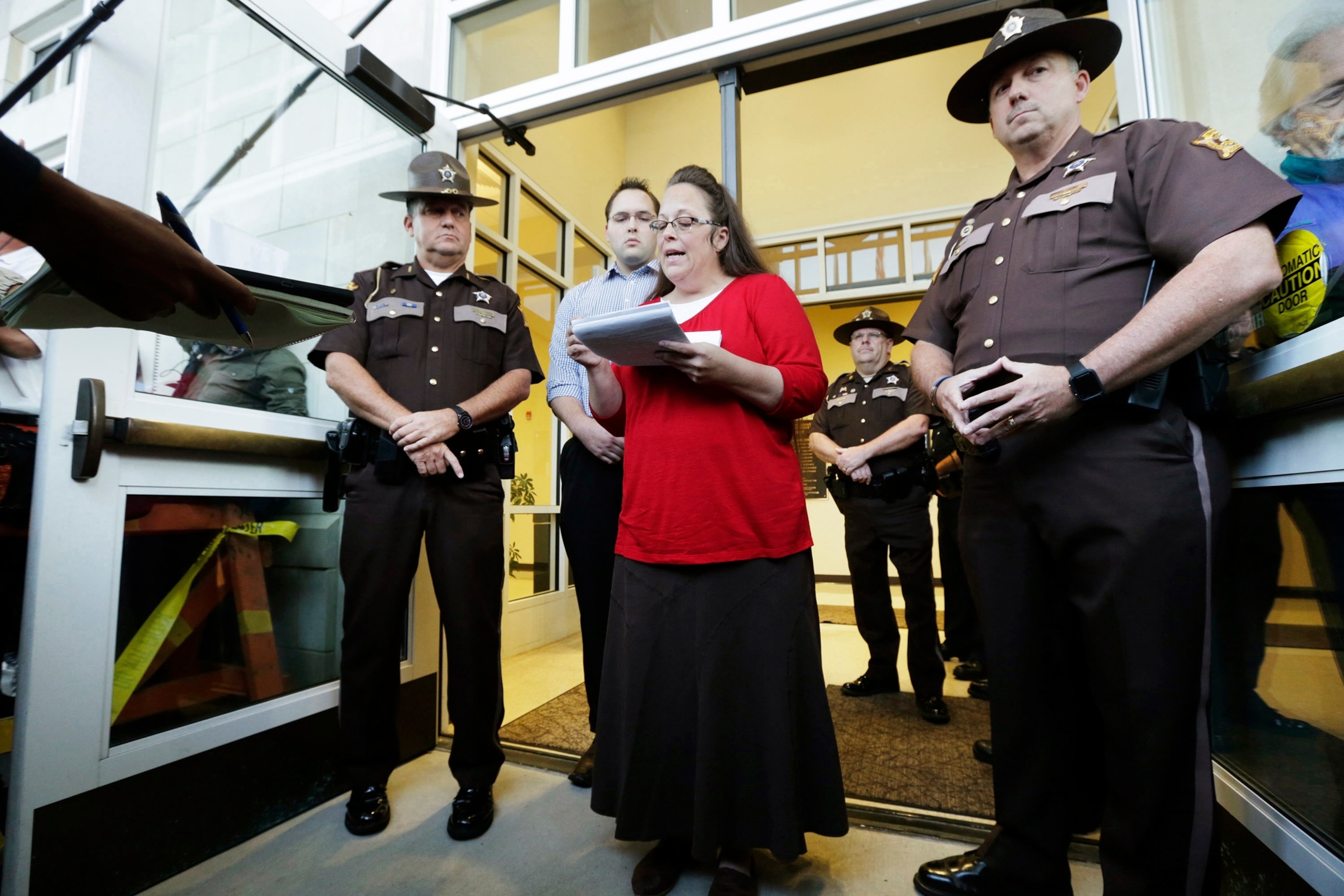
A new legal challenge has emerged to the landmark 2015 U.S. Supreme Court decision that legalized gay marriage nationwide. The case, led by Kim Davis, a former Kentucky clerk who became the face of religious opposition to same-sex marriage, seeks to overturn the historic Obergefell v. Hodges ruling.
This case could potentially bring significant changes to the legal landscape of same-sex marriage in the United States.
In 2015, the Supreme Court’s 5-4 decision in Obergefell v. Hodges legalized same-sex marriage across the country, marking a decisive victory for the LGBTQ+ community and affirming the constitutional right to marry for same-sex couples.
The ruling was celebrated by many as a major step forward for civil rights and equality. However, the case also sparked heated controversy, particularly among conservative religious groups who felt the decision infringed upon their beliefs about marriage and religious liberty.
Kim Davis, the former Rowan County, Kentucky, clerk who refused to issue marriage licenses to same-sex couples on religious grounds, became one of the most prominent figures in the opposition to the Obergefell ruling.
In 2015, Davis was jailed for six days after refusing to issue marriage licenses to same-sex couples in defiance of the Supreme Court's ruling. Her refusal led to a national outcry, with many framing the case as an attack on religious liberty and the rights of individuals who objected to same-sex marriage on religious grounds.
Now, Davis is back in the legal spotlight. She, along with her attorney Matthew Staver, has filed a petition asking the Supreme Court to reconsider its decision in Obergefell.
Staver, a well-known conservative legal advocate, has expressed optimism that the Court will take up the case. He argues that the original Obergefell decision was “egregiously wrong” and that it lacks any constitutional basis.

“The Obergefell decision was deeply damaging, far outside the bounds of any reasonable interpretation of the various constitutional provisions it cited, and set out on a collision course with the Constitution from the day it was decided,” Staver wrote in his petition.
The legal challenge from Davis and Staver represents the most significant threat to the legalization of gay marriage since it was affirmed by the Supreme Court over a decade ago.
It is a reminder of the deep cultural and legal divides that remain in the United States regarding the issue of same-sex marriage. While Obergefell legalized gay marriage nationwide, the case has continued to spark debate about the role of religious freedom in a pluralistic society and whether the government can mandate that individuals participate in actions that conflict with their religious beliefs.
The petition filed by Davis focuses on the notion of "substantive due process" – a legal doctrine that the Court has used to expand certain rights beyond those explicitly mentioned in the Constitution.
Davis’ legal team argues that the Court created a “fundamental right” to same-sex marriage in Obergefell, even though the right is not explicitly mentioned in the Constitution.
The petition claims that the Court's opinion in Obergefell “lacks any basis in the Constitution” and has led to harmful consequences for religious liberty.
Davis and her legal team argue that the decision in Obergefell has placed individuals like Davis in an untenable position, forcing them to choose between their religious convictions and their duties as public servants.
Davis has repeatedly stated that her refusal to issue marriage licenses to same-sex couples was based on her Christian beliefs, and she claims that the ruling in Obergefell has made it increasingly difficult for people with religious objections to same-sex marriage to participate fully in public life without violating their beliefs.

The petition claims that until the Court revisits its creation of what it calls "atextual constitutional rights," Obergefell will continue to have damaging consequences for religious liberty.
Davis’s legal team argues that religious objectors are being punished for their beliefs, and they assert that it is time for the Court to revisit the issue of substantive due process.
While the petition for reconsideration of Obergefell could present a real threat to same-sex marriage, many legal experts are skeptical about the chances of the Court overturning the decision.
The makeup of the Supreme Court has changed dramatically since 2015. In recent years, the Court has moved further to the right, with the appointments of Justices Neil Gorsuch, Brett Kavanaugh, and Amy Coney Barrett.
These justices have been more inclined to question previous liberal rulings, as evidenced by their participation in the decision to overturn Roe v. Wade in 2022.
However, the issue of same-sex marriage remains significantly different from abortion in the eyes of many legal scholars. Despite the conservative shift on the Court, there remains broad public support for same-sex marriage, and the issue has become embedded in American life.
Public opinion polls consistently show overwhelming support for gay marriage, and many legal observers argue that the Court is unlikely to reverse a decision that is so widely accepted by the American public.
Daniel Urman, a law professor at Northeastern University, expressed doubts that the current Court would be willing to overturn Obergefell, even if they chose to review the case.

“There’s a chance that a conservative majority could use the case to expand the rights of religious objectors to same-sex marriage,” he told Newsweek. “But that’s not the same as overturning the right itself, and I don’t see a majority of the Court ready to do that.”
Urman points out that some of the newer conservative justices, such as Gorsuch, Kavanaugh, and Barrett, may be hesitant to revisit Obergefell due to the significant cultural changes that have taken place since the decision was made.
While these justices may be sympathetic to arguments about religious liberty, they may not be willing to reverse a ruling that has become so ingrained in American society.
In the aftermath of Obergefell, same-sex marriage has been widely accepted, with nearly every state allowing gay couples to marry. Over the past decade, same-sex marriage has become a symbol of progress for the LGBTQ+ community, and its legalization has been celebrated as a victory for civil rights and equality.
Many activists and legal experts argue that overturning Obergefell would be a major setback for LGBTQ+ rights, potentially leading to a patchwork of state laws that could vary significantly from one jurisdiction to another.
It is also worth noting that, should the Court decide to overturn Obergefell, the issue of gay marriage would likely return to the states, where many do not have explicit laws on the books allowing same-sex marriage.
The decision could create a chaotic legal landscape in which same-sex couples in certain states would lose their right to marry, while others could continue to enjoy the right.
Despite the uncertainty surrounding the potential outcome of the case, the legal challenge has reignited debates about the scope of religious liberty and the role of the courts in shaping American society.

The Obergefell decision was a defining moment in the fight for LGBTQ+ rights, and any attempt to overturn it would undoubtedly have profound consequences for both the LGBTQ+ community and the broader cultural landscape.
For now, the Supreme Court has not indicated whether it will take up the case, and the legal challenge is still in its early stages. However, the fact that Davis and her legal team have taken the unprecedented step of petitioning the Court to reconsider Obergefell highlights the ongoing divisiveness of the issue and the deep cultural and political divisions that continue to shape the nation.
As the legal process unfolds, all eyes will be on the Supreme Court to see whether it will revisit Obergefell and, if so, what the consequences will be for the future of gay marriage in the United States.



